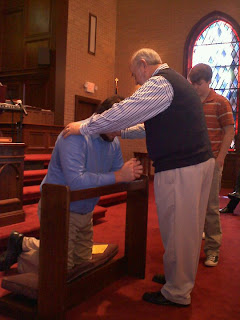Ordination is the setting apart of a person for leadership in the local church. While the Bible does not teach ordination as a sacrament of the church, it is important for setting apart leadership. Baptists believe in a personal, divine call to Christian ministry, and they have historically insisted on a procedure of ordination of those who have felt called and at the same time that indicates a confirmation of that call on the part of the congregation.
There is no description of an ordination service in the New Testament, but there is ample warrant for a simple ceremony of setting apart those who have proved themselves called of God to ministry. In 1 Timothy 4:14 there is a mention of a service of laying on of hands. (There is an elaborate service of ordination of Aaron and his sons to priesthood in Leviticus 8 and Numbers 8, but we are all believer-priests.)
In the New Testament, 1 Timothy 4:14 is the closest we have in the New Testament to our idea of ordination. Here a body of elders/pastors laid hands on Timothy and connected that action with the reception of a gift from the Holy Spirit as an enablement for ministry. In Acts 6:6 and 13:3, the congregation used the laying on of hands to set apart people to special ministries. In Acts 6 it was to be a deacon. In Acts 13 it was missionary service. In Acts 6 the apostles laid hands on them. In Acts 13 could refer to leaders or the whole congregation. Acts 6 gives a number of insights into the meaning of ordination.
In the New Testament, 1 Timothy 4:14 is the closest we have in the New Testament to our idea of ordination. Here a body of elders/pastors laid hands on Timothy and connected that action with the reception of a gift from the Holy Spirit as an enablement for ministry. In Acts 6:6 and 13:3, the congregation used the laying on of hands to set apart people to special ministries. In Acts 6 it was to be a deacon. In Acts 13 it was missionary service. In Acts 6 the apostles laid hands on them. In Acts 13 could refer to leaders or the whole congregation. Acts 6 gives a number of insights into the meaning of ordination.
Ordination is a process of acknowledging a leader who is
- Called and equipped by God (Acts 6:3, 5, 6) “full of the Holy Spirit and wisdom.” Jesus called his disciples (Mark 3:14; John 15:16; John 20:21-23)
- Nominated and affirmed in his call by the church (6:3) “Brothers, seek out from among you seven men of good reputation.” The church at Antioch set apart Saul and Barnabas (Acts 13:2-4).
- Appointed by the leadership (6:3) “whom we may appoint over this business.” Saul and Barnabas ordained elders from among the new churches (Acts 14:23) and told Titus to do the same (Titus 1:5).
- By the imposition of hands and prayer (6:6) “and when they had prayed, they laid hands on them.” Timothy was ordained by the church and Paul in this manner (1 Timothy 4:14; 2 Timothy 1:6). The imposition of hands in the OT represents God’s commission, blessing, and equipping for service (Levitical priests - Numbers 8:10; Joshua – Numbers 27:18-23 & Deuteronomy 34:9; Jacob - Genesis 48:1-20).
- Caution: We are admonished not to be too hasty in laying on hands (1 Timothy 5:22).
- Results: When leaders are called, chosen, and appointed in a Biblical manner, the church will be blessed and grow (Acts 6:7).
No distinctions gained. What cannot be found in these verses is any basis for a distinction in the membership of the church between laity and clergy in anything more than a functional sense. There is no basis for ordination conferring any special powers that other members of the congregation do not have, no idea of succession, nor any idea that ordination is required to be a church leader. Ordination does not make a person more holy or qualify him to baptize or administer the Lord’s Supper. These are Catholic ideas.
Advantages of Ordination
| D.L. Moody |
| C.H. Spurgeon |
1. Protection from heretical, unprepared pastors. If ordination councils take their jobs seriously, they can protect churches from false teaching, unhealthy situations, or unprepared leadership. Unfortunately most ordination councils, both in the association and the local church, serve only as rubber stamps.
2. Affirmation and confirmation of one’s calling. Ordination can affirm and confirm the leading of the Holy Spirit in one’s life. His belief that he has been called to ministry is verified by this brothers and sisters in Christ. While God’s call to the individual is inward and secret, ordination is a healthy public confirmation provided by the church.
3. Congregational Approval. Ordination allows the church to set apart (Acts 13:3; Numbers 8:10) those called to leadership in the local church. It is the congregation that sets apart, not the leadership or ordination council. It is the job of the ordination council to make a recommendation on the fitness of a person for ministry. It is the church which sets apart. Then the leadership appoints. This arrangement affirms congregational government, and it commits the leader to his ministry, with the prayers and support of the people behind him.
4. Legal requirements. Some states legally require ordination to perform funerals and weddings. In North Carolina one has to be ordained to perform a wedding. In order to perform a wedding in Virginia, one must register with a county clerk of court, provide proof of ordination, have a paper filed with the church clerk’s signature verifying that you actually are pastor of the church you claim, and it must be receive approval from the county clerk. Ordination also provides some nice tax advantages!


No comments:
Post a Comment